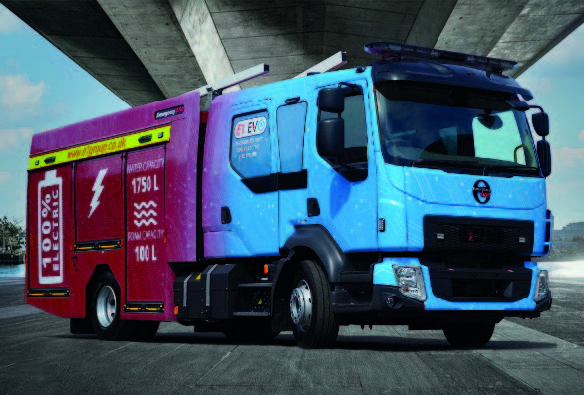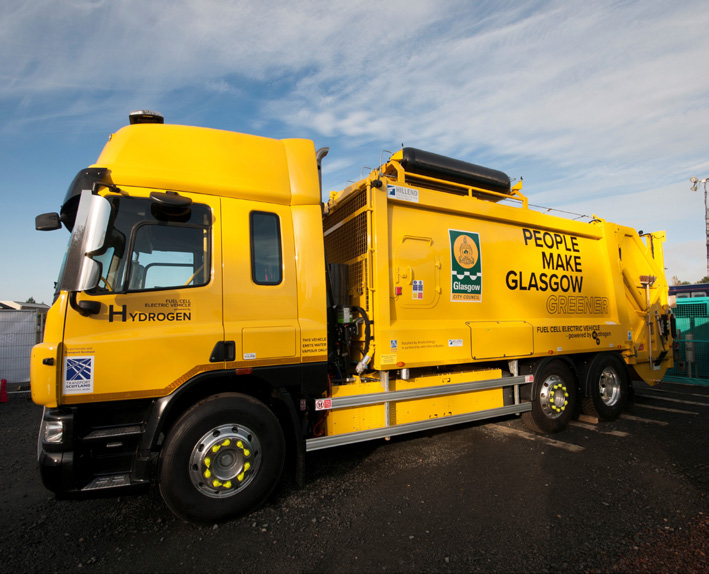Delivering the vision - Public Procurement for Innovation
Scotland’s public sector, industry and academia should work to deliver a new generation of domestically developed and produced zero emission vehicles and infrastructure, harnessing public sector procurement for major projects and public sector fleet to act as a catalyst for de-risking innovation.
Case Study - Emergency One
Scottish based company, Emergency One (E1), launched the world’s first electric fire engine in 2020 from Cumnock. The new E1 EV0™ fire engine uses battery power for both its engine and water hose pump and is a direct result of significant innovation work by E1. With an output of 250 vehicles a year, E1 is the UK’s largest manufacturer of specialist fire and rescue service vehicles and equipment.
Scottish Enterprise’s innovation teams worked closely with the company to develop the project and awarded a £500,000 grant in 2019 as a contribution towards the company’s £1.7m research and development in the new vehicle.
The company is now poised to target international markets with the new net zero emergency vehicle.
Director Steven Bell who confirmed the launch at COP26 stated:
It was great to see such a positive response for our E1 EV0TM, a lot of hard work and dedication went into this project, and we have seen interest in customers from France to the USA.
Customer response so far demonstrates that the want and need for this technology is there. With a tagline of 'zero emissions, zero compromise' for the EV0, we wanted to take our organisational commitment to the next level and ensure that the company as a whole also met this ethos.
The decision to offset our factory carbon footprint today was a logical choice and one we had to make.”
With government pressure on local authorities to plan for and deliver electric vehicle infrastructure, and move towards zero emission vehicle fleets, the E1 EV0™ launch has provided fire and rescue services with a proven solution for their future fire appliance fleets. The company continues to develop its range of low and zero emission specialist vehicles and achieving net zero status for its manufacturing operations was an important aspect of its ambitious environmental targets, whilst also recognising its customers’ responsible procurement goals.

Case Study - Glasgow City Council Hydrogen RCVs
In November 2019 the council approved a Fleet Strategy 2020 – 2030 which commits the council to decarbonise its fleet no later than 2030, and with the aspiration for that to be nearing completion within half that time.
The council has already made a significant start in moving its 3,000 strong fleet to zero emissions vehicles with over 300 EVs, 20 dual fuel hydrogen gritters and a full battery electric refuse collection vehicle (RCV) now in service.
The strategy dictates a broad split of battery electric for cars and vans, and hydrogen for heavy fleet. A great deal of research went into the selection of hydrogen as the optimum alternative fuel solutions. Whilst Glasgow is not a big city, in relative terms, it is recognised as having arduous duty cycles which are challenging from an operational perspective.
To convert the policy into action the council secured funding support from Transport Scotland to develop a hydrogen fuel cell (HFC) RCV prototype, repowering an existing council RCV. This was to robustly test the use and fuelling aspects of hydrogen before the wider deployment.

Fuunding was also secured to procure a temporary hydrogen refueler, which is now on site and dispensing hydrogen, to support the gritters and early 2022 the first of the HFC RCVs.
Early feedback on the prototype project enabled the council to run a competitive tender process to procure 19 new build HFC RCVs and secure a long term supply agreement for “Green” hydrogen.
The contract for the supply of 19 new build HFC RCVs was secured by Ballard Motive Solutions (formerly Arcola Energy), who are developing manufacturing capability at the Michelin Scotland Innovation Parc in partnership with Dunfermline-based Farid Hillend Engineering.
Priorities
Industry should work with the Scottish Government to build on learning from work in this area to date to develop more potential procurement for innovation with local authorities and other public sector fleet owners.
Adapting to new ways of procuring innovative solutions could be a focus for skills development in public sector bodies.
< Previous | Contents | Next >